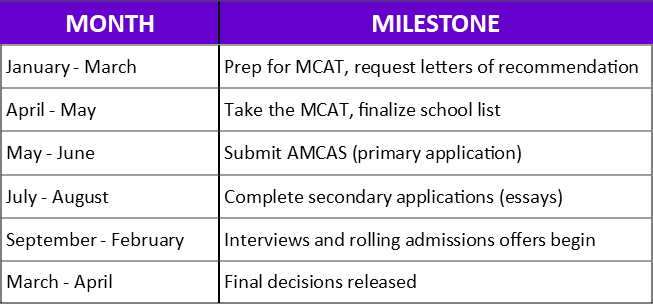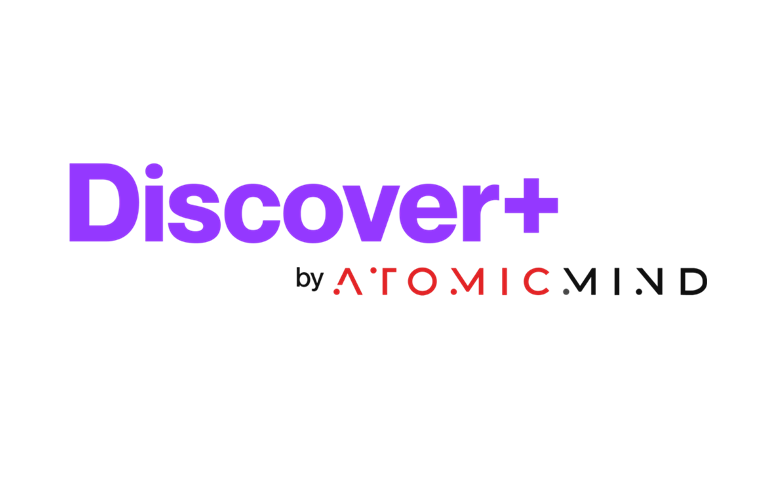
What You Need to Know When Applying to Medical School
By
Vicky Hioureas
September 30, 2025
•
2
min read
Share this Article
Simply highlight text to share on social or email
For aspiring doctors, the path to medical school can feel like one long checklist: GPA, MCAT, shadowing, research, volunteering, and the infamous personal statement. But it’s not just about ticking boxes, it’s about crafting a clear, compelling narrative that shows who you are and why medicine is the right path for you.
Whether you’re a college junior just starting to prepare or a senior about to apply, this guide will walk you through the process, step-by-step, with expert insights on how to maximize your chances.
Understanding the Medical School Application Timeline
Unlike college admissions, the med school application process starts early and the timeline matters. Medical school admissions are rolling, meaning applicants who apply early tend to have better outcomes.
Here’s a general overview:

Pro Tip: The AMCAS portal (used by most U.S. med schools) opens in May, but submissions don’t begin until early June. Submitting within the first two weeks of the cycle can give you a significant advantage.
Core Requirements: What Medical Schools Expect
When we talk about “medical school,” we’re referring to both MD programs (Doctor of Medicine) and DO programs (Doctor of Osteopathic Medicine). Both degrees lead to full medical licensure in the U.S., but DO programs emphasize a more holistic, preventive approach and include training in hands-on techniques called Osteopathic Manipulative Treatment (OMT). Most requirements for MD and DO programs are the same, though there are subtle differences in philosophy, competitiveness, and application platforms.
Regardless of which you’re applying to, nearly every medical school requires a similar set of academic and experiential qualifications:
1. Strong GPA
- Aim for a 3.7+ cumulative and science GPA (for MD programs).
- Doctor of Osteopathic Medicine (DO) programs may be slightly more flexible, but still competitive.
- Grades in prerequisite courses (e.g., bio, chem, orgo, physics) carry significant weight.
2. MCAT Score
- A strong MCAT is often 512+ for top-tier schools.
- Most applicants take the MCAT in spring of junior year or summer before senior year.
- Prep with 3–6 months of consistent study, including full-length practice tests.
3. Clinical Experience
- Shadowing doctors, scribing, or working as a CNA, EMT, or MA all demonstrate exposure to the field.
- Quality > Quantity: depth and reflection matter more than hours alone.
4. Research
- Not required, but highly recommended, especially for academic or research-focused med schools.
- Lab work, summer fellowships, and independent projects are all great options.
5. Volunteering & Service
- Demonstrate empathy, leadership, and a desire to help others.
- Long-term commitment (especially with underserved communities) is most impactful.
Telling Your Story: Primary and Secondary Essays
AMCAS Personal Statement
You’ll write a single personal statement (5300 characters max) that goes to every school. This is your chance to reflect on your motivations for becoming a physician, not just list achievements.
Avoid:
- Clichés like “I’ve always wanted to help people”
- Abstract generalizations or overused metaphors
Do:
- Tell a story. Use specific moments that shaped your path.
- Reflect on your growth. How did these experiences influence who you are today?
- Show self-awareness, curiosity, and clarity of purpose.
Work & Activities Section
You’ll describe up to 15 activities, including 3 “most meaningful” entries (which include additional space to reflect). Be specific, quantify your impact when possible, and show progression over time.
Tips:
- Focus on what you did, not just the organization’s mission.
- Show consistency and commitment.
Secondary Applications
Once your AMCAS is verified, you’ll start receiving school-specific secondary essays. Some schools send them automatically; others screen based on GPA/MCAT.
These often include:
- “Why our school?”
- Ethical dilemmas or challenges
- Diversity and inclusion reflections
Advice: Pre-write common prompts based on previous years’ questions, so you’re not overwhelmed when 10 secondaries drop in one day.
Interviews: It’s Not Just About Academics Anymore
Medical school interviews are often the final step before admission. Formats include:
- Traditional interviews (one-on-one)
- Multiple Mini Interviews (MMI): stations with short, scenario-based prompts
- Group interviews or panel discussions
To prepare:
- Practice mock interviews
- Read up on current issues in healthcare
- Reflect on your application and be ready to discuss your motivation, experiences, and goals
Admissions committees want to see not just intelligence, but emotional maturity, communication skills, and ethical reasoning.
What Makes You Stand Out in a Sea of Future Doctors?
In a pool of thousands of qualified applicants, differentiation is key. What can help you rise?
- Authenticity: Let your values and voice shine through. Don’t just write what you think they want to hear.
- Reflection: Schools want thinkers. Show that you’ve processed your experiences deeply.
- Service and impact: It’s not just about helping people, it’s about how, where, and why you do it.
- Growth mindset: Show that you’ve evolved over time and learned from setbacks.
Final Thoughts: Applying to Med School Is Hard, But You Don’t Have to Go It Alone
Med school admissions can feel overwhelming…and for good reason. It’s one of the most competitive and complex application processes out there. But with the right plan, timeline, and mentorship, it’s completely manageable.
At AtomicMind, our expert advisors (which include physicians, admissions specialists, and former med school interviewers) help students craft compelling narratives, master the MCAT, choose the right-fit schools, and confidently navigate every step of the process.
Want to boost your chances of getting into medical school?
Let’s build a strategy that highlights your strengths and tells your story powerfully—because getting in isn’t just about stats. It’s about showing why you’ll be a future leader in medicine.

About the Author: Vicky holds a PhD in History from Princeton University and earned her BA in English at UCLA. She brings over two decades of experience in education, and as Head Advisor at AtomicMind, she guides students with insight, care, and academic rigor. Vicky is passionate about empowering young minds to discover their passions and achieve their full potential.

Share this Article



